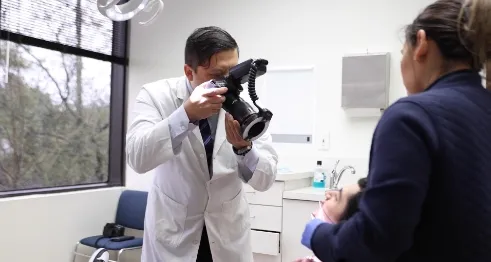Facial Trauma Treatment Houston
Expert Care for All Facial Injuries
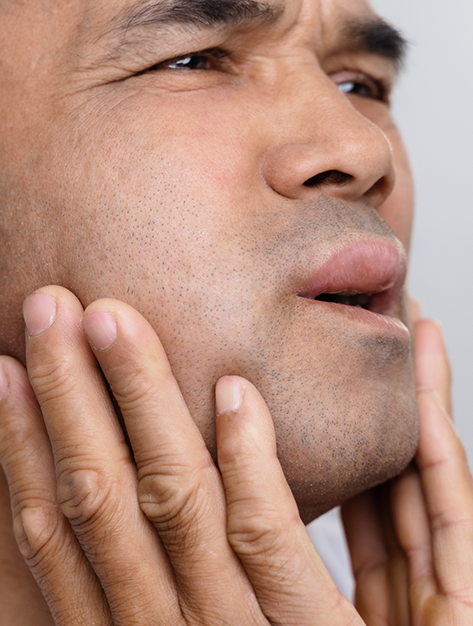
Life is difficult after sustaining any kind of injury, but this is especially true when it comes to facial trauma. Whether due to a motor vehicle accident, sports incident, or even domestic violence, serious injuries to the face, teeth, and jaw can easily leave someone hurting both inside and out. These kinds of issues require treatment by a certified specialist, which is exactly what you’ll find at Piney Point Oral & Maxillofacial Surgery of Houston. Your oral surgeon can evaluate your situation, discuss your treatment options, and provide whatever care you might need using the latest technology and techniques. Keep reading to learn more about facial trauma treatment in Houston.
Why Choose Piney Point Oral & Maxillofacial Surgery of Houston for Facial Trauma Treatment?
- We Offer Dental Sedation & General Anesthesia
- Board-Certified, Highly Credentialed Oral Surgeons
- Dependable, Helpful & Welcoming Dental Team
Most Common Types of Facial Trauma
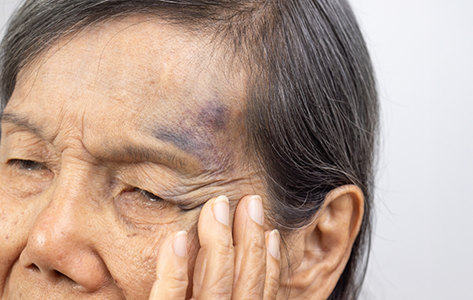
Facial trauma typically refers to injuries involving the soft and hard tissues of the head other than the brain. Oral surgeons are able to help patients with fractures in the frontal bone (forehead), orbitals (eye sockets), cheekbones, nose, as well as the upper and lower jaw. These kinds of problems often occur in tandem with facial lacerations and broken/knocked out teeth, both of which the team can correct as well.
Your Expert Oral Surgery Team
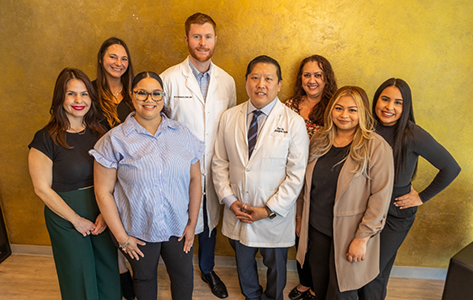
Piney Point Oral & Maxillofacial Surgery of Houston is led by two esteemed doctors with extensive experience in the field of oral and maxillofacial surgery.
After obtaining his DDS degree from the University of Texas at Houston, Dr. Steve Koo completed an oral and maxillofacial surgery residency at the University of Texas Health Center at Houston. He went on to become a Diplomate of the American Board of Oral & Maxillofacial Surgery. Today, he continues to expand his knowledge and refine his skills by maintaining memberships in both the American Association of Oral & Maxillofacial Surgery as well as the American College of Oral & Maxillofacial Surgery.
Dr. Thomas Weil received his surgical certification in 1973, and over the decades, he has consistently dedicated himself to continuing education. On top of his wealth of experience, he continues to learn about the latest techniques, tools, and research, so our patients can always benefit from the latest advancements in the field. He is a Fellow of the American Association of Oral & Maxillofacial Surgery and a Diplomate of the American Board of Oral & Maxillofacial Surgery.
The Treatment Process for Facial Trauma
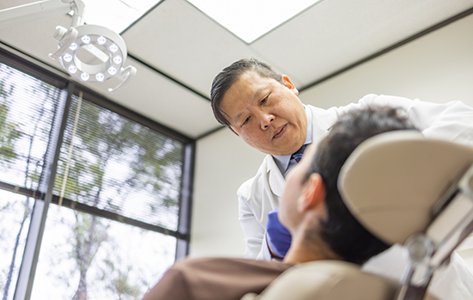
Many facial trauma patients are referred to oral surgeons by their general doctor or dentist, but if you’ve recently experienced any trauma to your face or teeth and have lingering symptoms such as pain, swelling, a change in eyesight, or dizziness, then you should visit Piney Point Oral & Maxillofacial Surgery of Houston for an evaluation.
After giving you a thorough exam, your oral surgeon will discuss their observations and recommend any treatments. Once you agree on your treatment plan, the team will then help you schedule your procedure(s). You’ll be given pre-op instructions so that your treatment day is guaranteed to go smoothly.
Once your procedure is completed, you’ll likely experience some bleeding, discomfort, and swelling around the treatment area. You’ll be prescribed pain medication and given fresh dressings as well as a variety of post-op instructions that should have you feeling like normal within a week or so. The recovery time for these procedures can vary quite a bit from patient to patient, and your oral surgery team will give you a more defined timeline when you visit them for an evaluation.
Our Technology
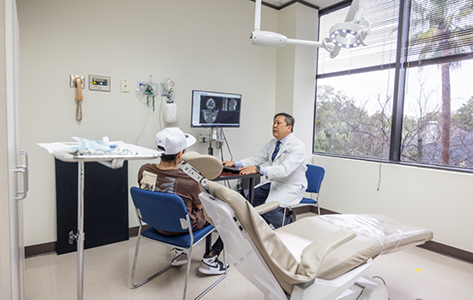
The doctors at Piney Point Oral & Maxillofacial Surgery of Houston take great pride in their work and leave nothing to chance, which is why the facility feature some of the latest technology available today.
CT scan-guided surgery enables your oral surgeon to perform any procedure with extreme precision because it allows them to work from a highly detailed 3D X-ray model of your anatomy. Intraoral digital scanning helps quickly and accurately create impressions of the teeth and bite without making you deal with messy dental putty. Bone grafting can build up any weak areas of bone to make them stronger and more responsive to treatment, and modern tissue and bone engineering techniques can speed up healing and tissue regeneration after any procedure.
Come Get the Care You Deserve
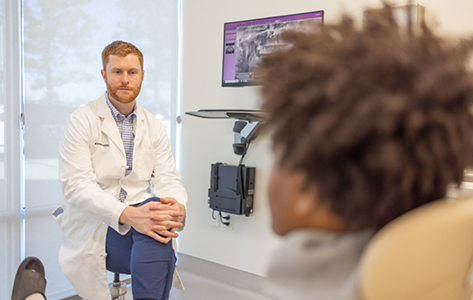
Facial trauma can damage someone both physically and mentally, greatly affecting their quality of life, but at Piney Point Oral & Maxillofacial Surgery of Houston, the team has the tools and expertise to help anyone rebuild from injury. If you’re in need of oral surgery in Houston because of a facial or dental injury, know that the team is ready and able to help. To schedule a consultation, contact the office today.
Facial Trauma Treatment FAQs
What Dental Injuries Are Treated by an Oral Surgeon?
Oral surgeons commonly treat fractures of the entire facial skeleton including the frontal bone (forehead), orbits (eye sockets), cheekbones, and nose, as well as fractures of the maxilla and mandible (the upper and lower jaw). Lacerations (cuts) to the scalp, face, ears, and the neck often occur in conjunction with these injuries and they are best repaired at the same time.
Injuries to the oral structures (teeth, gums, and tongue) are common as well, and while some can be addressed by your dentist, most will likely be repaired by an oral and maxillofacial surgeon. In short, essentially all non-neurological injuries to the face are within your oral surgeon’s expertise and scope of practice.
How Can I Tell If My Injury Is Serious and Should Be Evaluated by an Oral Surgeon?
If you have been injured and you have any doubt about the need to seek medical care, you should consult with a caregiver to at least help you assess the seriousness of your injuries. Anytime there has been a loss of consciousness following head trauma, no matter how brief, you should consult with an emergency care facility or your physician. If you have suffered a facial injury and there is a noticeable change in your appearance, eyesight, breathing, occlusion (bite), swallowing, or speaking, you should seek medical care.
Frequently, fractures to bones of the face are accompanied by subtle changes. Double vision, visual blurriness, and pain behind the eye may represent a fracture to the orbit (eye socket) and/or cheekbone. The sensation of teeth being out or loose or that the occlusion (bite) is off often indicates a fracture of the upper or lower jaw. Numbness or tingling to the skin of the face and lips can also point to a significant injury. In short, if you feel that something unusual is happening, you should at least seek consultation with a professional to evaluate the seriousness of the injury.
What Do I Do If My Tooth Gets Knocked Out or Becomes Loose?
This is a common injury. If the teeth have been knocked completely out, remember that in terms of the survival of the teeth, time is of the essence. Try to find the teeth, rinse them with some plain, cool water without scrubbing them and place them in one of the following places:
- Back in their sockets, as this is the most physiologic environment.
- Alternatives include cold milk, saline, or water.
- In the mouth, under the tongue may be a suitable choice if the patient is awake and alert.
Often, the teeth can be reimplanted and splinted or braced to the neighboring teeth and they will survive. Sometimes, the bone that holds the teeth (alveolar process) is also fractured and needs to be stabilized with a type of wire similar to orthodontic braces. If the teeth have been loosened but not knocked-out and your bite feels off, these teeth may be repositioned and splinted for proper healing. Under most circumstances, this type of injury can be treated with excellent results, and assuming they are reimplanted quickly, most teeth can be saved.
The majority of avulsed teeth will also need endodontic (root canal) treatment to prevent their loss after the initial healing period. Remember that the time the tooth is out of its socket is the most critical factor in determining its eventual survival or loss. When the time out of the socket exceeds two hours, most will not survive even with aggressive treatment.
If the teeth do not survive, they can be replaced by implants and new teeth fabricated to replace those lost. If you have such an injury, call an oral surgeon’s office or your dentist immediately so that care may be rendered in a timely fashion.
If I Break My Jaw, Will It Need to Be Wired Shut?
Most likely not. Most of the fractures of the bones of the face can be treated with very small titanium plates and screws that allow for the bones to heal without the need for limitation of jaw movement. As far as the jaws are involved, the fracture can be immobilized with these plates and screws. The fracture heals by being held in place by the plates, and the patient can continue to function without the drawback of having the teeth wired together.
If the fractures are very unstable, you may need to have the jaws wired together for a short period of time. There are some types of fractures where the option of a short period of intermaxillary fixation (being wired shut) for seven to 10 days results in a better outcome than the alternative of rigid bone plate fixation without the need for open surgery. Your doctor will discuss all of these alternatives with you at the time of your consultation and afford you an opportunity to make an informed decision about your treatment.
Will There Be Any Scars on My Face After My Oral Surgery Procedure?
State-of-the-art techniques used by oral surgeons allow them to reach most facial fractures, using no skin incisions. By placing incisions inside the mouth or inside the lower eyelid, for example, most jaw, cheekbone, and orbital fractures can be repaired without incisions on the face.
Occasionally, the severity of the injury necessitates a skin incision. These are generally placed in a skin fold under the jaw or behind the hairline to camouflage them and once healed are nearly imperceptible. If you or your surgeon notices an unsatisfactory scar, this can be improved by scar revision techniques that include laser surgery.
When Can I Return to Work After a Serious Facial Injury?
Most patients that have sustained serious facial injury can anticipate a one-to-three-day hospitalization period followed by a few more days of recovery at home. Depending on your occupation, you may be able to return to work in a week or less. There may still be residual bruising and swelling, but you will likely feel well enough to work by a week after repair, barring further disability.
What About Complications from the Oral Treatment of My Fractures?
Traumatic injuries to the face, when appropriately treated, generally heal quite well. Although complications are rare, they can occur with any type of treatment. Fractures involving the orbits often produce diplopia (double vision) as a consequence of the traumatic changes to the bones surrounding the eye. Treatment is generally directed to remediating these changes, but rarely, visual changes can persist after initial treatment, necessitating further care. Likewise, numbness to the skin of the cheek or lips is often a consequence of facial fractures and may persist even after surgery.
Fractures of the jaws can lead to changes in the bite that may require braces to correct, TMJ pain and dysfunction, loss of teeth, and numbness to the lips and tongue. Using modern techniques, the treatment of facial, jaw, and dental fractures is safe, predictable, and provides excellent results for most patients.
Where Can I Go to Be Evaluated for My Facial Injuries?
If the injury is severe or it has caused you to become unconscious, you should be evaluated in one of the local emergency rooms. The doctors at Piney Point Oral & Maxillofacial Surgery of Houston are on staff at several of the local hospitals and can be called to evaluate you in the hospital. If the injury is less severe, you can contact the office for an evaluation.
The office is equipped to provide care for a wide range of injuries to the face and jaws, and your oral surgeons in Houston can provide care for patients that includes repair of lacerations, stabilization of loose teeth, fixation of broken jaws, and the treatment of other injuries. These treatments can be performed under general anesthesia for painless surgery.
Dr. Weil and Dr. Koo are qualified to provide outpatient anesthesia, analgesia, and state-of-the-art treatment of injuries to the face, jaws, and teeth.
Wisdom Teeth Extraction Oral & Maxillofacial Pathology Oral Cancer Screenings Orthognathic Surgery Dental Implants Pre-Prosthetic Surgery Apicoectomy Surgery Cleft Lip & Palate Surgery TMJ Treatment Corrective Orthodontic Surgery Sleep Apnea Treatment Cosmetic Facial Treatments Anesthesia & Sedation Dentistry Emergency Dentistry View Our Services

